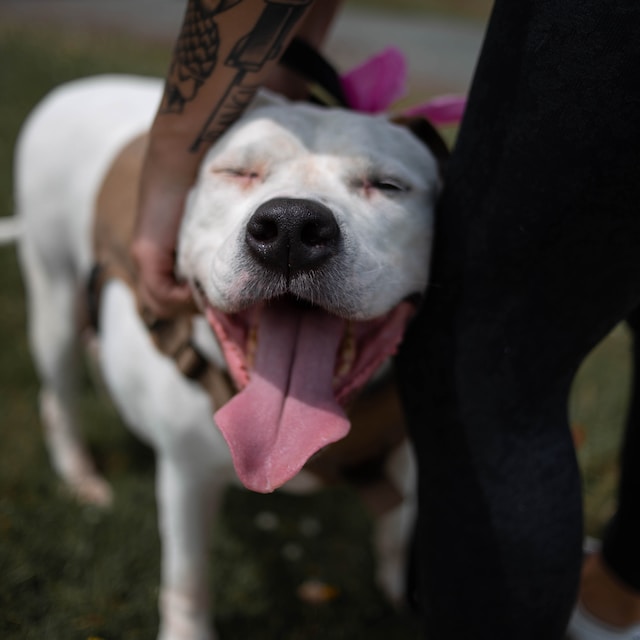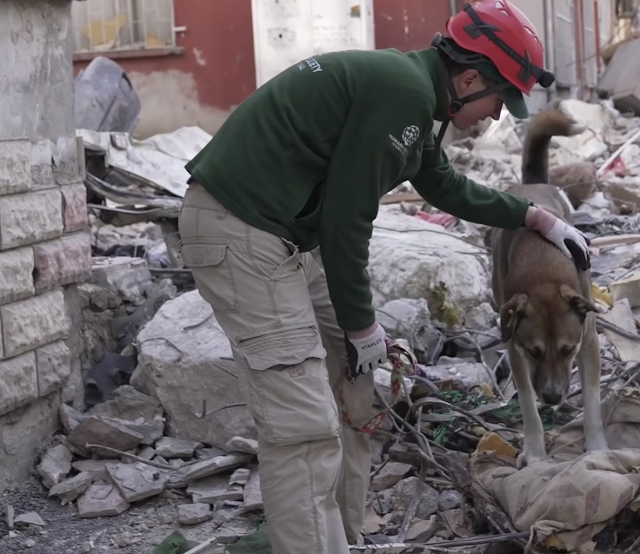It’s hard to walk through any town without seeing homeless people who, often through no fault of their own, are living on the street.
navbar
Thursday, 25 January 2024
The charity that’s helping homeless people to care for their pets
It’s hard to walk through any town without seeing homeless people who, often through no fault of their own, are living on the street.
Thursday, 9 November 2023
Do people care more for dogs or cats? Recent research puts this age-old question into focus
It’s a debate as old as time – dogs versus cats – and how much their owners care for them.
Are people really either a ‘dog’ or cat’ person? Do they have to be different, and must they be one or the other?
Now new research published in Psychology Today sheds light on owners’ attitudes and devotion to their beloved companions, investigating whether dog or cat owners have a stronger emotional attachment for their respective pets.
A difficult thing to determine, you would think, as it would be based on loyalty, devotion and love for the companion animal. However the study quantified it by asking how much an owner would be prepared to spend on their dog or cat on life-saving veterinary care, should it be needed.
Owners, were asked “if your pet had a life-threatening problem and could be saved by a medical procedure, what would you be willing to pay for treatment?’.
The amount dog owners were prepared to spend was approximately double that of cat-owners on cats!
However, certain factors need to be considered...
For example, dogs, on average, are taken to the vet twice as often as cats, and are more likely to receive preventative care such as vaccinations and dental treatment. This could show that dog owners are more used to the financial demands of ownership, and therefore more willing to accept that they will pay more for an emergency medical procedure.
Many owners of both dogs and cats have medical insurance, and this is also likely to affect their answer.
Dogs can also be ‘high maintenance’, with owners willing to pay for regular grooming and in some cases day care for walking or drop in visits for their dog. Cats, on the other hand, are usually more ‘low maintenance’, can be groomed by the owner or groom themselves, and being more independent, can be left without company for longer periods.
Whilst the findings are interesting, it is hard to accept that simply because dog owners are willing to spend more on emergency care, it means they are more devoted to their animal companion.
Many cat owners are utterly devoted to their pets, and will do whatever is necessary for them if needed. As a lifelong cat owner, I can certainly vouch for this. The bond that a cat and its owner has is every bit as special as dog and owner. Cats are sometimes more selective about who they give affection to, so to be ‘chosen’ by a cat is indeed special. Cat owners are more likely to have more than one pet, too.
Many people have both cats and dogs (or have owned both but not simultaneously) and love them equally. Those who have both would be unlikely to prioritise one over the other, as they are all part of the family.
So, whilst the research produced interesting findings, it is difficult to quantify by money alone how devoted owners are to their animals. The bond between any good owner and companion, no matter what species or breed, is priceless.
Thursday, 28 September 2023
Greyhound racing - dogs deserve better than to be put at risk in the name of 'sport'
A night at the dogs… a traditional evening of eating, drinking, maybe a little wager on a winner, watching excited greyhounds chase round a track after an artificial prey that they never catch.
Fun? Or cruel, exploitative and potentially fatal for the Greyhounds?
There are only 10 countries in the world where Greyhound racing takes place legally, and four of those are in the UK. It is a minority interest activity, with research showing that 91% of the British public don’t follow or participate in Greyhound racing (source YouGov poll).
So it would seem that only a few people enjoy a ‘sport’ that causes thousands of injuries to the dogs that are bred for racing and have no choice but to participate (22,284 from 2018 to 2022). Sadly there are many fatalities too: in fact, 2,392 in the same time period. The average age of a racing Greyhound is 2-3 years.
Greyhounds are sighthounds – a type of hound with amazing vision, bred to run fast and with a hunting instinct, so it would seem that they are naturally adapted to racing. However, there is nothing natural about running on a curved track at speed, in close proximity to up to five other dogs. The conditions are inherently dangerous, as running on a curve puts unnecessary pressure on their bodies meaning a high risk of injury to their left fore-leg and right hind-leg. With the curve of the track and the uneven forces on their bodies as they run at up to 45mph, the dogs have no option but to slow down or run wider on bends, and this can cause fatal collisions to happen. A study in New Zealand found that 68% of injuries and 75% of fatalities occurred on or approaching the first bend of the track. Some tracks have moved to using sand instead of grass to increase running speed even more.
Greyhounds enjoying energetic play
Greyhounds are by nature gentle and make good family pets when correctly socialised. However, concerns remain around the conditions that racing Greyhounds are kept in from puppyhood. Their kennelling, care standards, lack of socialisation and exercise may all be inadequate. Dogs are only suitable to race for a limited time, then as they age they became superfluous and require rehoming, rehabilitation and medical treatment. Many do not receive this and are inhumanely destroyed.
It would be impractical to ban or close down the industry overnight as thousands of Greyhounds would become homeless and may be unnecessarily euthanised. However, charities such as the Blue Cross are campaigning to bring Greyhound racing to an end over a five year period, so that dog welfare organisations can support the requirement to find Greyhounds suitable loving homes and owners, where they can be safely rehabilitated.
Organisations such as Seaside Greyhounds https://www.seasidegreyhounds.org.uk/ already exist. It helps retired greyhounds to be re-homed into suitable loving environments with patient owners who can offer them the chance to socialise and live out their retirement happily.
Let’s hope that legislation changes for the better, to give Greyhounds better lives in the future, without fear of injury in the name of sport.
Thursday, 31 August 2023
Beagles used in animal testing experience freedom for the first time
Photo credit © Beagle Freedom Project UK
Photo credit © itv News/Beagle Freedom Project UK
One of the rescued Beagles enjoying freedom. Photo credit © Beagle Freedom Project UK
Beagle Freedom Project is part of a worldwide organisation that rescues and re-homes animals used in experimental research: since 2010 it has liberated thousands of animals. It campaigns to end their abuse and has received endorsement from UK-based celebrities including Will Young, Graham Norton and Deborah Meaden. Find out more about the Project’s work here.
The Duke and Duchess of Sussex even adopted a Beagle called Momma Mia from the US-based arm of the organisation. Momma Mia was rescued from a research facility in Virginia, but now lives with the VIP couple in California!
Momma Mia, rescued by the Duke and Duchess of Sussex photo © Beagle Freedom Project UK
Beagles are often chosen for animal testing as they have docile natures. Sadly, whilst animal testing continues, the role of the rescue and campaigning organisations like Beagle Freedom Project is key in increasing awareness, and helping to save innocent animals like these Beagles, and give them the chance to experience freedom to live as they should.
There are many ways to help the Beagle Freedom Project, you can find out more on its website: https://bfpuk.org/
Thursday, 6 July 2023
Pet food banks - helping those struggling to feed their animals
Most people have been affected by the increasing cost of living in the last couple of years. With interest rate rises, price increases on essentials such as food and heating, and having to make income stretch further than ever, it is a challenging time for many.
However, some animal charities and pet food retailers have stepped in to help.
A Blue Cross charity pet food bank (c) image thanks to Blue Cross
Local to us here at Hubble & Hattie in Dorset charity Dorset Dogs have 23 drop-off points for food donations across the county, and can even arrange to collect! Dorset Dogs also has seven dog food banks – a lifeline for local dogs and owners in difficult times.
Thursday, 4 May 2023
Emotional support animals - a trusted friend providing companionship and comfort
The comfort provided by an emotional support dog
Cats can ‘tune in’ to emotions and provide comfort
Thursday, 9 March 2023
Dogs help to find earthquake survivors, and animals rescued by charities
No one can fail to be moved by the scenes in the aftermath of the devastating earthquakes that hit
Turkey and Syria last month. Sadly, the number of those who lost their lives has been high in
both countries, and the the damage to buildings and infrastructure huge.
In the following days, countries around the world rallied to send resources and expertise
in search and rescue to help find survivors.
(c) Twitter M_Ebrard One of the Mexican dogs sent to hlp in Turkey
International search and rescue dog teams help find survivors
Mexico sent 16 experienced search and rescue dogs to Turkey. The country is itself prone
to earthquakes and during one in 2017 the dogs saved many lives and won the hearts of Mexicans.
A yellow Lab called Frida was credited with saving 12 lives across Mexico, and other quake sites in
Haiti, Guatemala and Ecuador.
Dog teams and handlers were also sent from Croatia, the Czech Republic, Germany, Greece,
Libya, Poland, Switzerland, the UK and the US. If a dog detects signs of life, debris often has to
be moved away very carefully and quietly, due to the risk of collapse and danger to those searching.
The dogs are highly trained to sniff out survivors, and can differentiate between them
and bodies, enabling the prioritisation of rescue of any people still alive in the rubble.
Amazing stories of survivors being rescued from collapsed buildings after many days have emerged,
thanks to the help of the dedicated rescue teams and their dogs.
(c) Twitter M_Ebrard Search dogs and thier handlers waiting to board a plane to Turkey from Mexico
Charities help rescue animals from the quake devastation
Not only people but animals have been rescued from collapsed buildings, sometimes weeks after the
earthquake. Charities such as Ernesto's in Syria, the Humane Society International (HSI) are
still rescuing both domestic pets separated from owners or sadly orphaned by the quake, and
farm animals found wandering or injured.
(c) HSI/facebook. Humane Society International worker rescuing a dog from the devastation
Amazingly, a dog was found alive in the rubble 23 days after the earthquake in Turkey (pictured
below), and a horse was also rescued, having survived after 21 days under rubble.
In Syria, the team from Ernesto's, an animal rescue charity, have been scouring the damaged towns
and villages for animals who need help. They either provide medication and food onsite or take
abandoned or orphaned pets back to their sanctuary where they can offer them a safe and happy life,
along with many other rescued cats, dogs and farm animals.
Amidst the heart-breaking loss of life, it is heartening to see that animals are both helping to
save lives, and themselves being rescued by caring people.
Members of the team from Ernesto's helping a young cat after the earthquake
Below, the dog found alive in Turkey 23 days after the earthquake (screenshot from film footage)


.jpg)




















